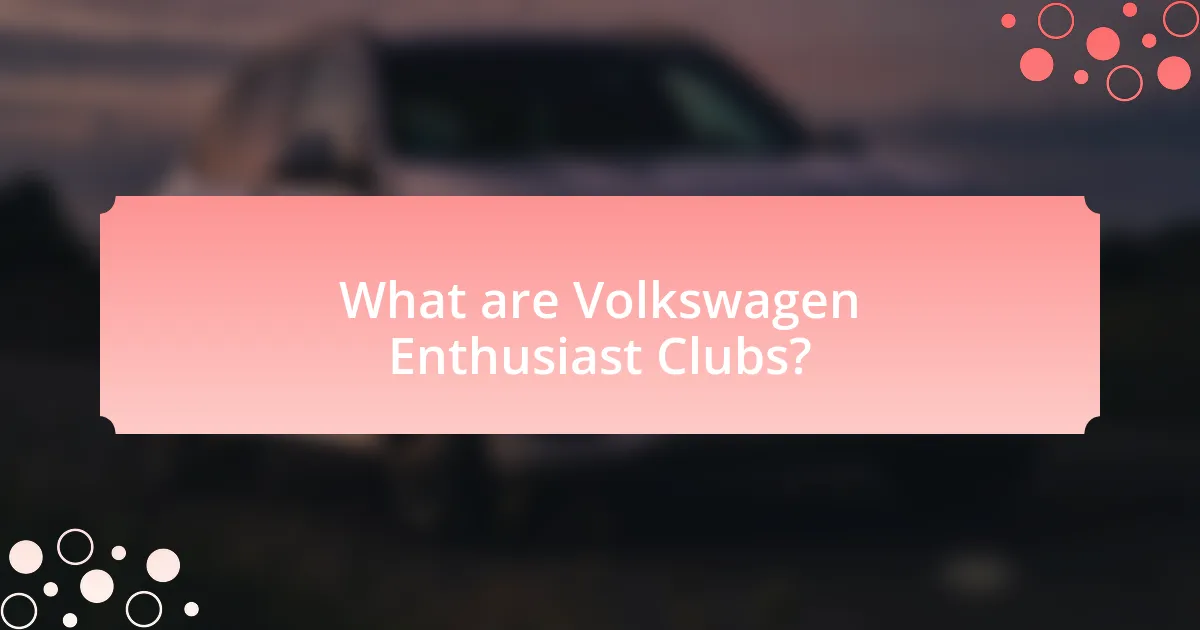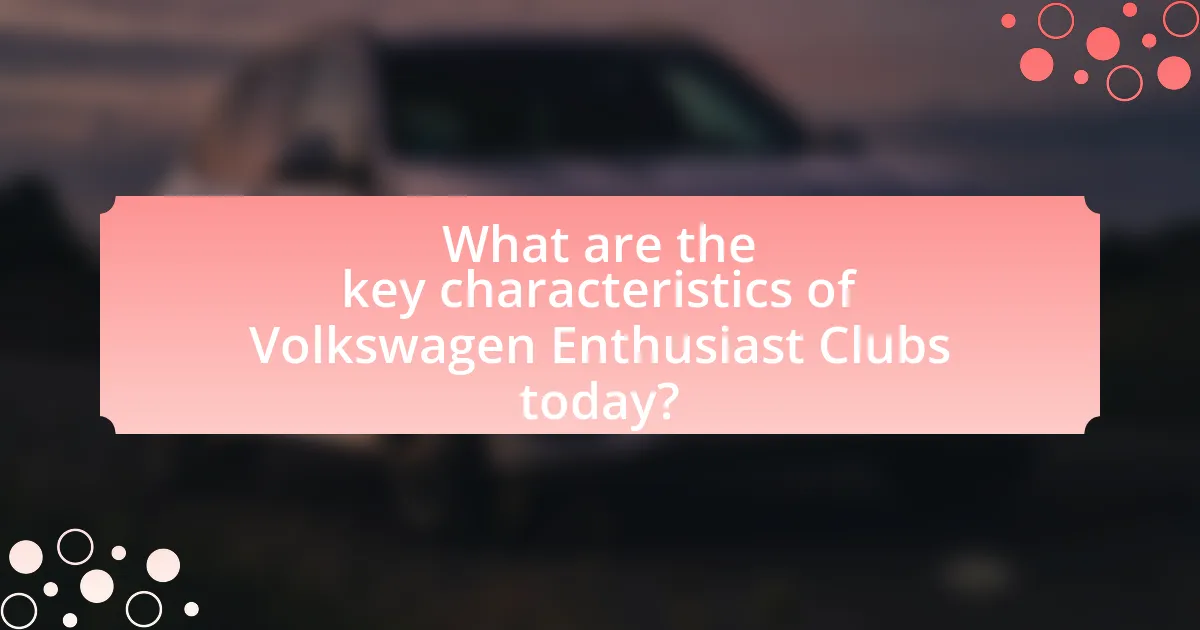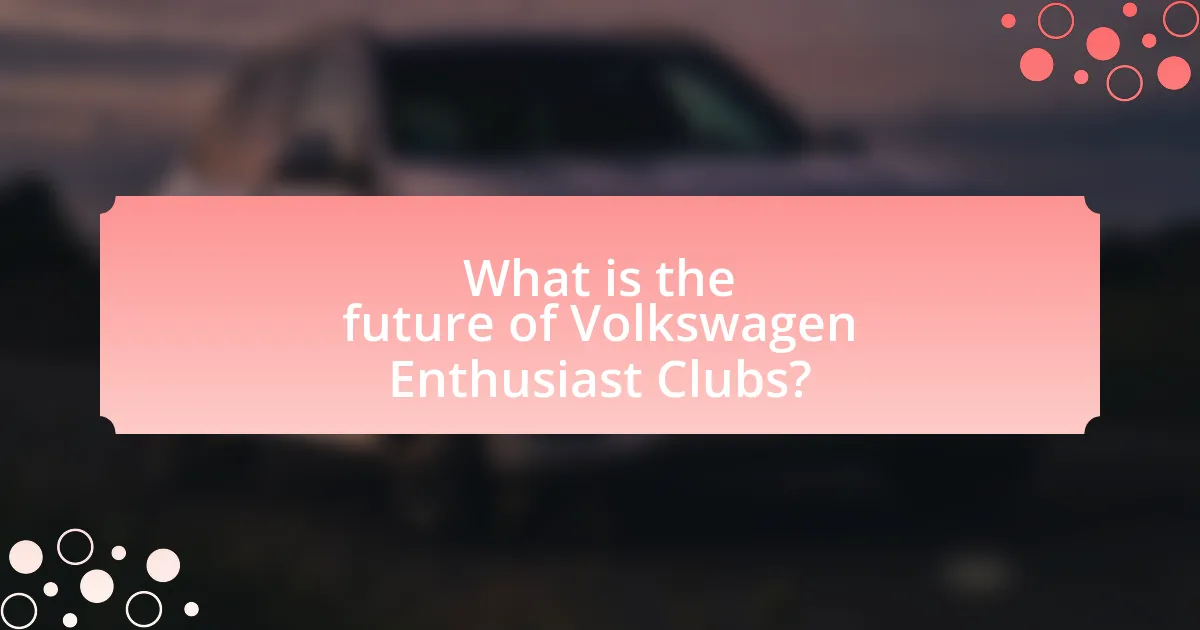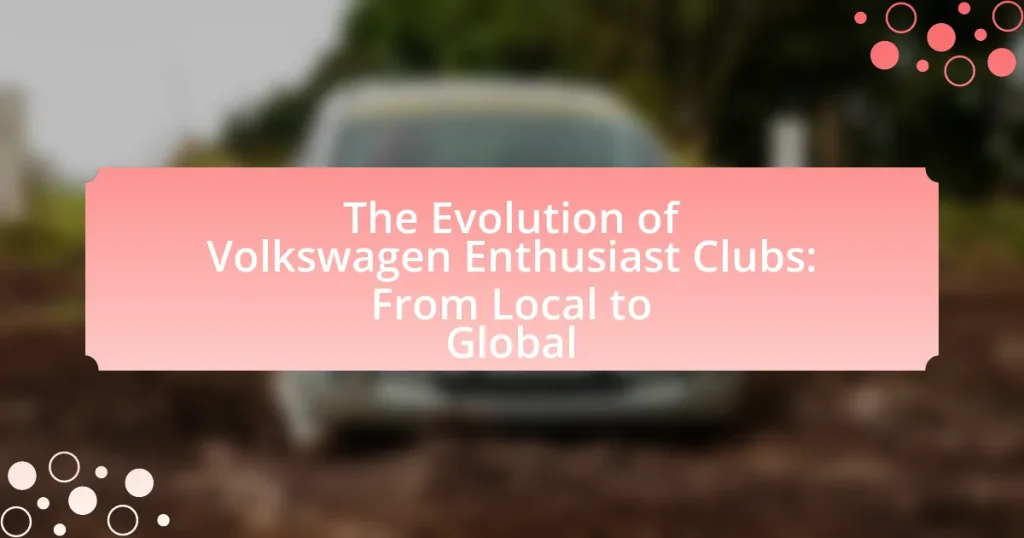Volkswagen Enthusiast Clubs are organized groups dedicated to celebrating Volkswagen vehicles, fostering community through events and shared experiences. Originating in the mid-20th century, these clubs have evolved from informal gatherings to structured organizations with global reach, influenced by historical events and cultural movements. The article explores the origins, purposes, and activities of these clubs, highlighting their role in building community among members and adapting to changing interests and technology. It also addresses challenges faced by clubs today, such as declining membership and competition, while discussing strategies for growth and sustainability in the digital age.

What are Volkswagen Enthusiast Clubs?
Volkswagen Enthusiast Clubs are organized groups of individuals who share a passion for Volkswagen vehicles, fostering community through events, discussions, and shared experiences. These clubs often host car shows, rallies, and meet-ups, allowing members to connect over their mutual interest in Volkswagen’s history, models, and culture. The existence of such clubs dates back to the mid-20th century, with the first known Volkswagen club, the “Volkswagen Club of America,” established in 1955, highlighting the long-standing tradition of Volkswagen enthusiasts coming together to celebrate their vehicles.
How did Volkswagen Enthusiast Clubs originate?
Volkswagen Enthusiast Clubs originated in the mid-20th century as a response to the growing popularity of Volkswagen vehicles, particularly the Beetle. Initially, small groups of owners formed to share their passion for the cars, exchange maintenance tips, and organize local meetups. The first official club, the “Volkswagen Club of America,” was established in 1955, providing a structured platform for enthusiasts to connect and celebrate their shared interest. This club’s formation marked the beginning of a network that would expand globally, fostering a sense of community among Volkswagen fans and leading to the establishment of numerous clubs worldwide.
What historical events contributed to the formation of these clubs?
The formation of Volkswagen enthusiast clubs was significantly influenced by the post-World War II economic recovery in Europe, particularly in Germany, where the Volkswagen Beetle became a symbol of affordable mobility. The Beetle’s mass production began in 1945, leading to a growing community of owners who shared a passion for the vehicle. Additionally, the 1960s counterculture movement in the United States embraced the Volkswagen brand, further solidifying its status and inspiring the establishment of clubs focused on camaraderie and shared interests. Events such as the first Volkswagen convention in 1970 in the U.S. also played a crucial role in uniting enthusiasts and formalizing club structures. These historical contexts demonstrate how economic, cultural, and social factors contributed to the formation and growth of Volkswagen enthusiast clubs globally.
Who were the early members of Volkswagen Enthusiast Clubs?
The early members of Volkswagen Enthusiast Clubs primarily consisted of Volkswagen owners, automotive enthusiasts, and individuals passionate about the brand’s unique vehicles, particularly the Beetle. These clubs emerged in the 1950s and 1960s, attracting a diverse group of individuals who shared a common interest in modifying, restoring, and celebrating Volkswagen cars. The formation of these clubs was often driven by local gatherings and events, which fostered a sense of community among members. Historical records indicate that the first official Volkswagen club, the “Volkswagen Club of America,” was established in 1955, further solidifying the network of enthusiasts dedicated to the brand.
What is the purpose of Volkswagen Enthusiast Clubs?
The purpose of Volkswagen Enthusiast Clubs is to foster a community among Volkswagen owners and fans, promoting shared interests in the brand’s vehicles and culture. These clubs provide a platform for members to connect, share knowledge, and participate in events, enhancing the overall ownership experience. Historically, these clubs have organized gatherings, car shows, and rallies, which not only celebrate Volkswagen’s heritage but also strengthen the bonds among enthusiasts, creating a global network that spans various regions and cultures.
How do these clubs foster community among members?
Volkswagen enthusiast clubs foster community among members by organizing events, facilitating communication, and creating shared experiences. These clubs host local and global gatherings, such as car shows and meet-ups, which allow members to connect over their shared passion for Volkswagen vehicles. Additionally, clubs often utilize online platforms and social media to maintain ongoing communication, share knowledge, and provide support, enhancing the sense of belonging. The collaborative nature of these activities encourages friendships and networks, reinforcing community ties among members who share similar interests and values.
What activities do Volkswagen Enthusiast Clubs typically organize?
Volkswagen Enthusiast Clubs typically organize events such as car shows, meet-ups, and rallies. These gatherings allow members to showcase their vehicles, share knowledge, and foster community among Volkswagen fans. Additionally, clubs often host technical workshops and restoration sessions, providing members with hands-on experience and expertise in vehicle maintenance. Many clubs also participate in charity events and community service, reinforcing their commitment to social responsibility. These activities not only enhance member engagement but also promote the Volkswagen brand and culture within the automotive community.
How have Volkswagen Enthusiast Clubs evolved over time?
Volkswagen Enthusiast Clubs have evolved from small, local gatherings focused on specific models to large, global networks that celebrate the brand’s heritage and community. Initially, these clubs were informal meetups among local owners sharing maintenance tips and experiences, but over the decades, they have transformed into organized entities with structured memberships, events, and online platforms. The rise of the internet in the late 1990s and early 2000s significantly contributed to this evolution, allowing enthusiasts to connect across borders, share resources, and organize international events like the Volkswagen Bus Festival. Today, clubs often host large-scale events, participate in charity work, and engage in social media, reflecting a broader cultural appreciation for Volkswagen vehicles and fostering a sense of global community among enthusiasts.
What changes have occurred in membership demographics?
Membership demographics in Volkswagen enthusiast clubs have shifted significantly over recent years, reflecting broader societal trends. The clubs have seen an increase in diversity, with a growing number of female members and younger enthusiasts joining, which contrasts with the historically male-dominated and older demographic. For instance, data from a 2022 survey indicated that female membership rose from 15% to 30% over the past decade, while members aged 18-30 increased from 10% to 25%. This evolution in demographics highlights a shift towards inclusivity and a broader appeal of Volkswagen culture, aligning with the brand’s efforts to engage a wider audience through modern marketing strategies and community events.
How has technology influenced the growth of these clubs?
Technology has significantly influenced the growth of Volkswagen enthusiast clubs by facilitating global communication and community building. The advent of social media platforms, online forums, and dedicated websites has allowed enthusiasts to connect, share experiences, and organize events regardless of geographical barriers. For instance, platforms like Facebook and Instagram enable clubs to reach a wider audience, attracting members from various countries and fostering a sense of belonging among Volkswagen fans worldwide. Additionally, the availability of digital tools for event planning and coordination has streamlined the organization of meetups and rallies, further enhancing club participation and engagement.

What are the key characteristics of Volkswagen Enthusiast Clubs today?
Volkswagen Enthusiast Clubs today are characterized by their strong community focus, diverse membership, and active engagement in events and online platforms. These clubs foster a sense of belonging among members who share a passion for Volkswagen vehicles, ranging from classic models to modern innovations. Many clubs organize local and international events, such as car shows and rallies, which promote camaraderie and knowledge sharing. Additionally, the use of social media and online forums has expanded their reach, allowing enthusiasts to connect globally, share resources, and exchange technical advice. This evolution reflects a shift from localized gatherings to a more interconnected global network of Volkswagen enthusiasts.
How do local clubs differ from global organizations?
Local clubs primarily focus on community engagement and regional activities, while global organizations operate on an international scale with a broader mission. Local clubs often emphasize personal relationships, localized events, and specific interests relevant to their immediate members, such as regional car shows or meetups. In contrast, global organizations like international Volkswagen clubs facilitate connections across countries, promote worldwide events, and often have structured governance and resources that support a larger membership base. For example, a local Volkswagen club may organize a weekend gathering, whereas a global organization might host an annual international convention, attracting members from various countries to share experiences and knowledge.
What are the unique features of local Volkswagen Enthusiast Clubs?
Local Volkswagen Enthusiast Clubs are characterized by their strong community focus, shared passion for Volkswagen vehicles, and organized events. These clubs foster camaraderie among members through regular meetups, car shows, and group drives, allowing enthusiasts to connect over their mutual interests. Additionally, they often provide resources such as technical support, restoration advice, and access to exclusive parts, enhancing the ownership experience. The clubs also promote local culture by participating in community events and charity drives, further solidifying their presence and relevance within the local automotive landscape.
How do global clubs facilitate international connections among enthusiasts?
Global clubs facilitate international connections among enthusiasts by providing a structured platform for members to share experiences, knowledge, and resources across borders. These clubs often utilize online forums, social media, and organized events to connect individuals with similar interests, such as Volkswagen vehicles. For instance, the Volkswagen Club of America hosts international meets and online discussions that allow members from different countries to exchange ideas and showcase their vehicles. This interconnectedness fosters a sense of community and belonging among enthusiasts worldwide, enhancing their passion for the brand and its culture.
What role do social media and online platforms play in these clubs?
Social media and online platforms serve as vital tools for Volkswagen enthusiast clubs by facilitating communication, community building, and event organization. These platforms enable members to share experiences, technical advice, and resources, thereby enhancing engagement and fostering a sense of belonging. For instance, Facebook groups and Instagram pages allow clubs to reach a global audience, attracting members from diverse geographical locations, which was not possible with traditional local meetups. Additionally, online forums and dedicated websites provide spaces for in-depth discussions and knowledge sharing, further solidifying the community. The rise of these digital platforms has transformed how enthusiasts connect, making it easier to organize events, share modifications, and promote club activities, ultimately leading to a more interconnected global network of Volkswagen fans.
How has social media changed the way enthusiasts interact?
Social media has transformed the way enthusiasts interact by facilitating instant communication and community building across geographical boundaries. Platforms like Facebook, Instagram, and dedicated forums allow Volkswagen enthusiasts to share experiences, advice, and resources in real-time, fostering a sense of belonging and collaboration. For instance, a study by the Pew Research Center in 2021 found that 69% of adults in the U.S. use social media, enabling enthusiasts to connect with like-minded individuals globally, share modifications, and organize events. This shift from local gatherings to online interactions has expanded the reach and diversity of Volkswagen enthusiast clubs, creating a more inclusive and vibrant community.
What online resources are available for Volkswagen enthusiasts?
Online resources available for Volkswagen enthusiasts include dedicated forums, social media groups, and websites that focus on Volkswagen models and culture. Popular forums such as VWVortex and TheSamba provide platforms for discussions, technical advice, and community events. Social media groups on platforms like Facebook connect enthusiasts globally, allowing for the sharing of experiences, modifications, and events. Additionally, websites like Volkswagen’s official site and enthusiast blogs offer news, reviews, and resources for parts and restoration. These resources collectively foster a vibrant community and support for Volkswagen enthusiasts worldwide.
What challenges do Volkswagen Enthusiast Clubs face today?
Volkswagen Enthusiast Clubs face challenges such as declining membership, generational shifts in interests, and the increasing complexity of vehicle technology. Membership has decreased as younger generations show less interest in traditional car clubs, with a 2021 survey indicating that only 30% of millennials engage in automotive hobbies compared to older generations. Additionally, the rise of electric vehicles and advanced technology in modern cars complicates the maintenance and modification of classic models, leading to a knowledge gap among newer enthusiasts. These factors contribute to the struggle of clubs to remain relevant and attract new members.
How do clubs address issues of membership retention?
Clubs address issues of membership retention by implementing engagement strategies that foster community and provide value to members. These strategies often include organizing regular events, such as meet-ups and car shows, which enhance social interaction among members and strengthen their connection to the club. Additionally, clubs may offer exclusive benefits, such as discounts on parts and services, which incentivize continued membership. Research indicates that clubs with active communication channels, like newsletters and social media groups, see higher retention rates, as these platforms keep members informed and involved. For example, a study by the International Journal of Nonprofit and Voluntary Sector Marketing found that organizations with strong member engagement practices retain up to 60% more members annually compared to those without such initiatives.
What impact does competition from other automotive clubs have?
Competition from other automotive clubs can lead to increased member engagement and innovation within Volkswagen enthusiast clubs. When clubs compete for members, they often enhance their offerings, such as organizing more events, improving communication, and providing better resources. For instance, a study by the Automotive Enthusiast Association found that clubs that faced competition saw a 30% increase in event participation and a 25% rise in member satisfaction due to improved activities and networking opportunities. This competitive environment ultimately fosters a vibrant community, encouraging clubs to adapt and evolve to meet the interests of their members.

What is the future of Volkswagen Enthusiast Clubs?
The future of Volkswagen Enthusiast Clubs is likely to see increased digital engagement and global connectivity. As technology advances, these clubs are expected to leverage social media platforms and online forums to connect members worldwide, facilitating the sharing of knowledge, resources, and experiences. Additionally, the growing interest in electric vehicles, particularly Volkswagen’s ID series, may lead to a shift in club activities and discussions, focusing on sustainability and innovation within the Volkswagen community. This evolution reflects broader automotive trends and the need for enthusiasts to adapt to changing market dynamics.
How might Volkswagen Enthusiast Clubs adapt to changing interests?
Volkswagen Enthusiast Clubs might adapt to changing interests by incorporating digital platforms and diverse activities that resonate with younger generations. As interests shift towards online engagement, clubs can utilize social media and virtual meetups to connect members globally, reflecting the trend of digital community building. Additionally, clubs can diversify their events to include electric vehicle discussions and sustainability initiatives, aligning with the growing interest in eco-friendly practices. This adaptability is supported by the increasing popularity of electric vehicles, with Volkswagen committing to a significant investment in electric mobility, indicating a shift in consumer preferences.
What trends are emerging among automotive enthusiasts?
Emerging trends among automotive enthusiasts include a growing interest in electric vehicles (EVs), increased participation in online communities, and a focus on sustainability. The shift towards EVs is evidenced by the rising sales of electric models, which accounted for 7% of global car sales in 2020, reflecting a significant change in consumer preferences. Online communities have expanded, with platforms like social media and forums facilitating connections among enthusiasts worldwide, allowing for the sharing of knowledge and experiences. Additionally, sustainability has become a priority, with many enthusiasts advocating for eco-friendly modifications and practices, aligning with broader environmental concerns.
How can clubs remain relevant in a digital age?
Clubs can remain relevant in a digital age by leveraging online platforms to engage members and expand their reach. Utilizing social media, clubs can create communities that foster interaction and share content related to Volkswagen culture, which enhances member participation and attracts new enthusiasts. For instance, a study by the Pew Research Center indicates that 69% of adults in the U.S. use social media, highlighting its potential as a tool for clubs to connect with a broader audience. Additionally, hosting virtual events and webinars allows clubs to provide valuable content and maintain member interest, regardless of geographical limitations. This adaptability to digital trends ensures that clubs continue to thrive and evolve in a rapidly changing environment.
What strategies can clubs implement for growth and sustainability?
Clubs can implement strategies such as diversifying membership offerings, enhancing community engagement, and leveraging digital platforms for growth and sustainability. Diversifying membership offerings, including tiered memberships or family packages, can attract a broader audience and increase revenue streams. Enhancing community engagement through local events, workshops, and collaborations with other organizations fosters a sense of belonging and loyalty among members. Leveraging digital platforms, such as social media and online forums, allows clubs to reach a global audience, share resources, and facilitate communication, which is essential for maintaining interest and participation. These strategies are supported by the fact that clubs with active online presences and community involvement report higher retention rates and member satisfaction.
How can clubs leverage partnerships with automotive brands?
Clubs can leverage partnerships with automotive brands by collaborating on events, co-branding initiatives, and exclusive member benefits. These partnerships can enhance the club’s visibility and credibility while providing automotive brands with direct access to a passionate audience. For instance, Volkswagen enthusiast clubs can organize joint events such as car shows or track days, which not only promote the brand but also engage members in unique experiences. Additionally, offering exclusive discounts or promotions on automotive products can incentivize club membership and foster loyalty. Such collaborations have been shown to increase brand engagement; for example, brands that partner with enthusiast clubs often see a rise in customer retention and brand advocacy, as evidenced by studies indicating that community-driven marketing strategies can boost sales by up to 20%.
What best practices can enhance member engagement and participation?
To enhance member engagement and participation in Volkswagen enthusiast clubs, implementing regular events and activities is essential. These events, such as meet-ups, car shows, and workshops, foster community interaction and strengthen relationships among members. Research indicates that clubs with frequent social gatherings see a 30% increase in member retention rates, as members feel more connected and valued. Additionally, utilizing digital platforms for communication and feedback allows members to share their experiences and suggestions, further increasing their involvement. Engaging members through surveys and polls can lead to tailored activities that resonate with their interests, thereby boosting participation.
What practical tips can Volkswagen enthusiasts follow to get involved?
Volkswagen enthusiasts can get involved by joining local clubs and attending events. Engaging with local Volkswagen clubs provides opportunities for networking, sharing knowledge, and participating in group activities such as car shows and meet-ups. Additionally, enthusiasts can participate in online forums and social media groups dedicated to Volkswagen, which facilitate discussions and information sharing. According to the Volkswagen Club of America, there are over 200 local clubs across the United States, highlighting the extensive community available for enthusiasts to connect with.


